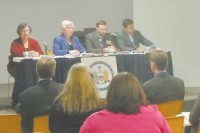Galef, NYC Officials Meet for Campaign Finance Reform Forum

campaign finance reform forum.
Big money equals big success with most political campaigns, with millions of dollars pouring in from a smaller donor base to fuel candidates and incumbents to victory. In order to expand this donor base to the average citizen and candidate, Assemblywoman Sandy Galef met with New York City activists last Saturday to discuss the notion of publically financed campaigns.
Galef invited Dick Davey of the Citizens Union, Jesse Layman of Citizen Action of New York and Susan Lerner of Common Cause New York to discuss campaign finance reform in terms of decreasing the weight of special interests in elections to invigorate citizens to not just vote for campaigns, but donate to an elected official of their choice.
This would be made possible by a publically financed campaign system, where a citizen’s donation would be matched 6 to 1, much like New York City. According to Galef, New York City has enjoyed this sort of system for over 20 years and has seen success in decreasing corruption, increasing participation and widening the field in city council races.
“A couple of problems are the size of donations and the shockingly small number of people that are participating in the electoral process as donors on any level,” Layman said.
According to Layman, in New York State just .50 percent of citizens gave even just one penny to any political campaign the past two election cycles.
“Roughly 80 percent of the money raised by candidates, winners and losers, for New York State office came in checks of $1,000 or more,” Layman said. “Most of it is coming in big chunks from very few people—only 6 percent of money raised by candidates comes in checks of under $250.”
Having such a small base of donors is harmful to the campaign process, as candidates are focusing their energy and efforts to those who have the funds to finance campaigns and not so much to voters and small donors.
“We want elected officials to be free to spend their time with the ordinary citizens of their districts, the same people they want to vote for them should be the people that will fund their campaigns,” Layman said. “And that is possible with public matching funds.”
In order to reduce the effects of money in politics, public matching funds essentially increase the value of a donation made by small donors. According to the New York City Campaign Finance Board, donations made by city residents are matched on a 6 to 1 basis—meaning a $175 contribution turns into $1,050.
“City Council races in New York City are a lot like state assembly races in terms of the number of people running for office, and what we’ve seen is that with the public matching funds system they have a 6 to 1 match on donations under $175—the incentive structure has changed dramatically and the behavior of candidates and residents has changed as a result.”
Layman said that roughly 25 percent of donations given to city council races last election cycle were for $175. Unlike state races, donations of $250 composed 65 percent monies given to candidates.
“Political campaign contributions rank down the list in terms of disposable income, but it’s a very important thing to make our democracy operate,” Davey said. “And that’s why from a philosophical point-of-view, it’s very important that we incentivize these small donations.”

Adam has worked in the local news industry for the past two decades in Westchester County and the broader Hudson Valley. Read more from Adam’s author bio here.
